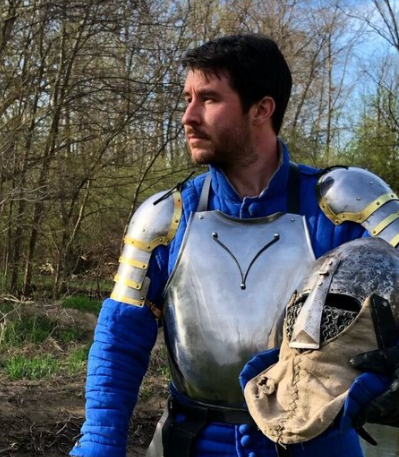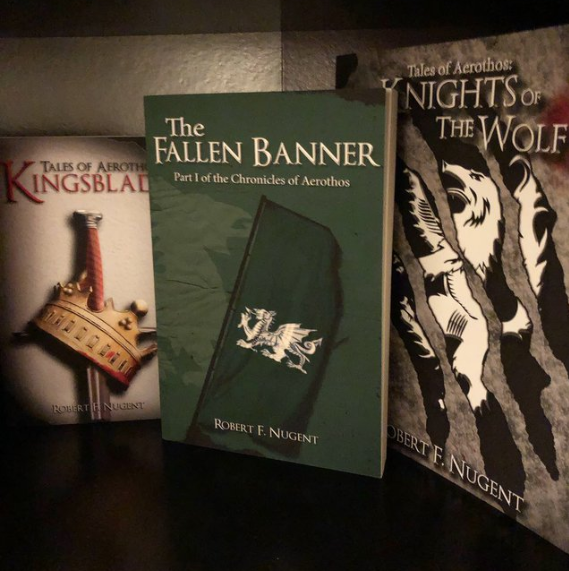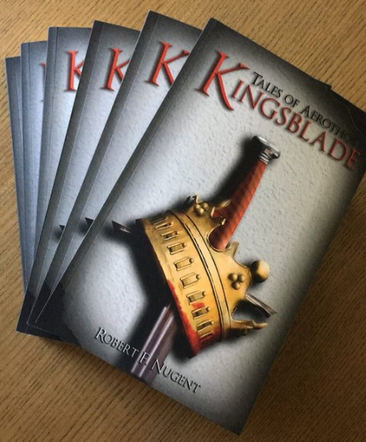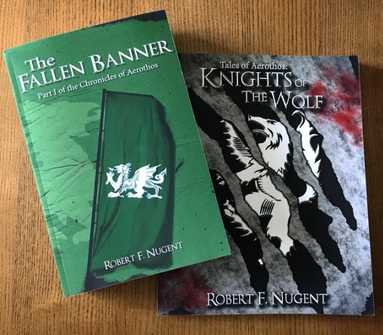The poleaxe is such a versatile weapon, yet the longsword is arguably the most iconic piece of medieval imagery This last question is driving me crazy! There’s so many people I want to choose… Vladimir the Great, William the Conqueror, Saladin, Alexander Nevsky, Edward III, Geoffroi de Charney… The list goes on. At the end of the day though, I think I would have to say Henry V. Aside from Shakespeare’s play, Henry V is the most iconic figure of the Middle Ages for me. He has such a thrilling story and it all leads to the Battle of Agincourt, which is my favorite medieval battle. One of the most difficult things about writing is actually sitting down to write. As an independent author with three novels under your belt, do you have any advice for those who might struggle with just getting their story on the page? The best advice I can offer is to sit down and write. Just write. Get those words onto the page. You can edit and perfect your story as you go, but you can’t do that when you haven’t written it yet. The most common complaint I get from friends and peers wanting to become writers is that they get stuck in the planning phases, or they have this great idea, but won’t sit down to do it. You can figure out your plans in greater detail as you’re writing. Your great idea needs to be on paper if you want it to go anywhere. Nothing happens if there aren’t words on the page. Just write. The rest will follow! Your great idea needs to be on paper if you want it to go anywhere. Nothing happens if there aren’t words on the page.
When it comes to world-building, I have two key pieces of advice: First, study history. You don’t need to achieve a doctorate degree by any stretch, but having an understanding of the real world aspects of the setting you’re taking inspiration from is massively important. Knowing how people acted during certain events, how political bodies rose and fell, and the technology of the time and how it all worked together is a must-have for thorough world-building, in my opinion. First, study history. You don’t need to achieve a doctorate degree by any stretch, but having an understanding Second, always ask the question “Why?” when you create a new piece of the world. Why is this empire an empire? Why did these two nations fight? Why does this village exist where it does? Why did the people within the history of the world do the things that they did? The more you ask yourself that question, the more answers you’re going to come up with, and that is ultimately going to fill in the details of your setting. Before we get to talking about your book series I want to bring up one of your hobbies: medieval re-enactment. With your hands-on experience in medieval combat techniques I’d really like to know what fantasy writers get wrong about medieval combat. What are the most common misconceptions you encounter in books and movies and how can they be fixed? I would say, despite the many inaccuracies across books, movies, and video games, the most common incorrect portrayal is how armor functions. Armor is unavoidably such a crucial part of the Middle Ages and how the battlefield evolved - and that wouldn’t be the case if it was only mere costuming that wasn’t effective for protecting folks. ...despite the many inaccuracies across books, movies, and video games,
When we look at history, the bigger wars usually don’t happen because of something that occurred last week. I would argue that recent blockbuster hits such as Game of Thrones have really whetted an appetite for complex, large-scale fantasy stories among the general readership. However, that type of fiction is not something one just jumps into. How have you managed to handle the long history of a large fictional continent? Do you have endless piles of notes? Have you compiled A Brief History of Aerothos for your own reference? Or do you keep the entire world locked away in your head? I began with notebooks, but that was a bad move on my part. I lost too many scraps of paper and threw too many notebooks away! Now, I have all of my official notes on my computer, detailing periods of history, family lineages, and so on. But there’s a great deal of it that is kept in my head, since there’s really too much to formally write down (I’d probably never write books if I did!)
The Halryians themselves found their roots in Greco-Roman history, and some of that carries into the Chronicles with their successors, such as the kingdoms of Valtia and Arathen (very much so in a similar way as to say the Byzantine or Holy Roman empires and how they evolved from the end of antiquity and the fall of the western Roman Empire.) There are some other obvious comparisons in Aerothos as well, such as the Kingdom of Rovaskia being based on Scandinavian culture and the Kingdom of Rhodrien largely reflecting England, Wales, and Ireland. While Aerothos is primarily inspired by Western Europe, I personally have a deep interest in Eastern European and Arabic history as well, which I try to pull a lot of inspiration from. While I’m certainly inspired by other fantasy works, nearly all my ideas can find their origins in the real world. What is happening next in Aerothos and where can readers find out more? Right now I’m working on Part II of the Chronicles of Aerothos, which undoubtedly has a lot of work ahead of it still. I took a detour from Chronicles to write the Tales books, because I wanted to use those works to try new things and develop my writing. Now that I feel prepared, it’s time to return to the Chronicles and continue the epic story! Part II will be a much darker, gruesome story, as our heroes begin to face new challenges that come after the first season of war. The veil of glory and chivalry has been lifted, and now the true horror of war begins to fall upon Aerothos. The veil of glory and chivalry has been lifted, and now the true horror of war begins to fall upon Aerothos.
0 Comments
Leave a Reply. |
AuthorJoshua Gillingham is an author, editor, and game designer from Vancouver Island, Canada. Archives
April 2022
Categories
All
|





 RSS Feed
RSS Feed
